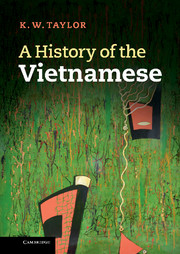Book contents
- Frontmatter
- Contents
- List of Figures
- List of Tables
- List of Maps
- Acknowledgements
- Introduction
- 1 The provincial era
- 2 The Ly dynasty
- 3 The Tran dynasty
- 4 The Le dynasty
- 5 The beginning of inter-regional warfare
- 6 The Fifty Years War
- 7 The south and the north diverge
- 8 The Thirty Years War
- 9 The Nguyen dynasty
- 10 The French conquest
- 11 Franco-Vietnamese colonial relations
- 12 Indochina at war
- 13 From two countries to one
- Retrospective
- Bibliographic essay
- Figures
- Tables
- Maps
- Index
11 - Franco-Vietnamese colonial relations
Published online by Cambridge University Press: 05 May 2013
- Frontmatter
- Contents
- List of Figures
- List of Tables
- List of Maps
- Acknowledgements
- Introduction
- 1 The provincial era
- 2 The Ly dynasty
- 3 The Tran dynasty
- 4 The Le dynasty
- 5 The beginning of inter-regional warfare
- 6 The Fifty Years War
- 7 The south and the north diverge
- 8 The Thirty Years War
- 9 The Nguyen dynasty
- 10 The French conquest
- 11 Franco-Vietnamese colonial relations
- 12 Indochina at war
- 13 From two countries to one
- Retrospective
- Bibliographic essay
- Figures
- Tables
- Maps
- Index
Summary
Intellectuals respond to the colonial regime
By the turn of the century, many educated Vietnamese were endeavoring to think their way through the events of the French conquest, aiming to arrive at some vision of a future for themselves or for their country. Not all Vietnamese were concerned with ideas about a Vietnamese country. The uneducated and probably most of the educated, though it is impossible to estimate with any certainty how many, were chiefly concerned with the welfare of themselves and their families, and they had no definite sense of identification with a nation in the twentieth-century sense. Prior ideas about a Vietnamese country had been almost entirely focused upon the monarchy and upon the mandarinate as an extension of it, which became decreasingly plausible as French rule stabilized.
In Cochinchina, the process of colonial transformation was already into a second generation of Vietnamese for whom the Nguyen monarchy at Hue had no concrete presence in their lives. The traditional mandarinate did not exist for them and educational opportunities pointed toward reading and writing alphabetically in the French and Vietnamese languages. Classical studies and character writing survived for a time in private schools, but soon faded away. Early twentieth-century responses to French rule in Cochinchina emerged with urban journalism, covert support of a monarch in exile, and rural millenarian movements.
- Type
- Chapter
- Information
- A History of the Vietnamese , pp. 484 - 523Publisher: Cambridge University PressPrint publication year: 2013



